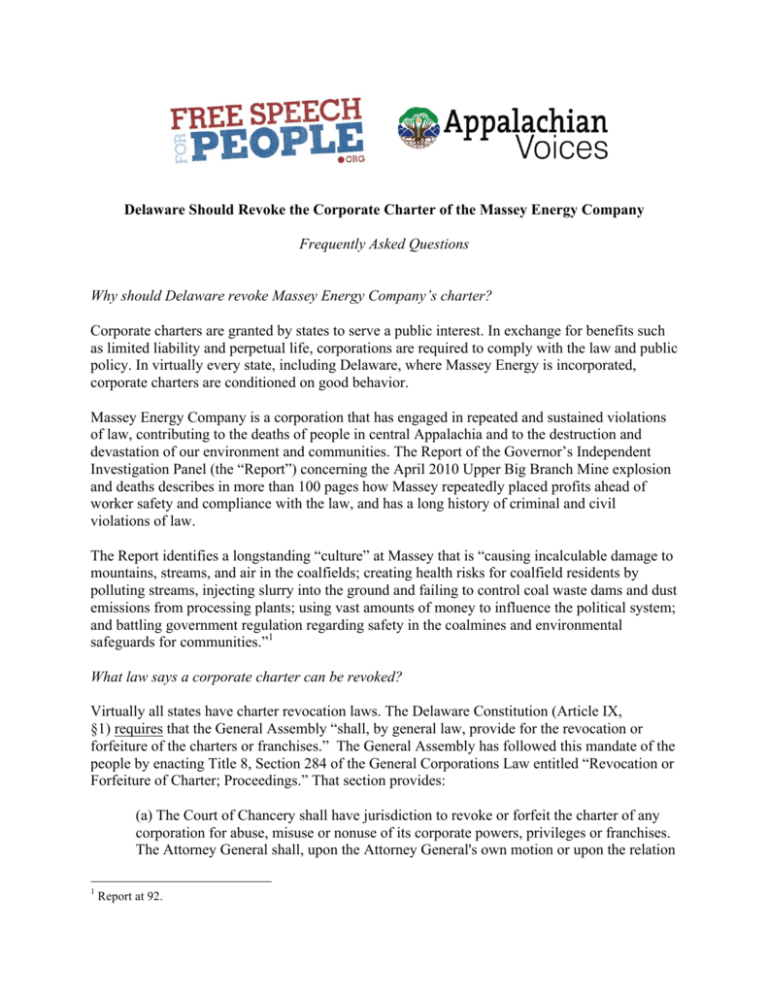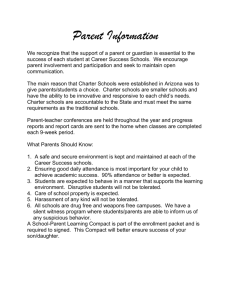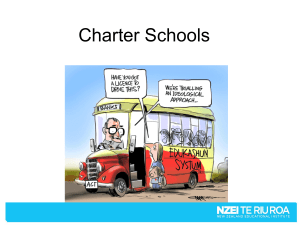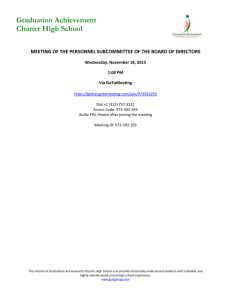Delaware Should Revoke the Corporate Charter of the Massey
advertisement

Delaware Should Revoke the Corporate Charter of the Massey Energy Company
Frequently Asked Questions
Why should Delaware revoke Massey Energy Company’s charter?
Corporate charters are granted by states to serve a public interest. In exchange for benefits such
as limited liability and perpetual life, corporations are required to comply with the law and public
policy. In virtually every state, including Delaware, where Massey Energy is incorporated,
corporate charters are conditioned on good behavior.
Massey Energy Company is a corporation that has engaged in repeated and sustained violations
of law, contributing to the deaths of people in central Appalachia and to the destruction and
devastation of our environment and communities. The Report of the Governor’s Independent
Investigation Panel (the “Report”) concerning the April 2010 Upper Big Branch Mine explosion
and deaths describes in more than 100 pages how Massey repeatedly placed profits ahead of
worker safety and compliance with the law, and has a long history of criminal and civil
violations of law.
The Report identifies a longstanding “culture” at Massey that is “causing incalculable damage to
mountains, streams, and air in the coalfields; creating health risks for coalfield residents by
polluting streams, injecting slurry into the ground and failing to control coal waste dams and dust
emissions from processing plants; using vast amounts of money to influence the political system;
and battling government regulation regarding safety in the coalmines and environmental
safeguards for communities.”1
What law says a corporate charter can be revoked?
Virtually all states have charter revocation laws. The Delaware Constitution (Article IX,
§1) requires that the General Assembly “shall, by general law, provide for the revocation or
forfeiture of the charters or franchises.” The General Assembly has followed this mandate of the
people by enacting Title 8, Section 284 of the General Corporations Law entitled “Revocation or
Forfeiture of Charter; Proceedings.” That section provides:
(a) The Court of Chancery shall have jurisdiction to revoke or forfeit the charter of any
corporation for abuse, misuse or nonuse of its corporate powers, privileges or franchises.
The Attorney General shall, upon the Attorney General's own motion or upon the relation
!!!!!!!!!!!!!!!!!!!!!!!!!!!!!!!!!!!!!!!!!!!!!!!!!!!!!!!!
1
Report at 92.
of a proper party, proceed for this purpose by complaint in the county in which the
registered office of the corporation is located.
What standard applies to a charter revocation action?
In Delaware, revocation of a corporate charter is appropriate in cases of “a sustained course of
fraud, immorality or violations of statutory law . . ..” Young v. the National Association for the
Advancement of White People, 35 Del.Ch. 10, 109 A.2d 29 (1954). Delaware courts have ruled
that “continued serious criminal violations by corporate agents in the course of the discharge of
their duties could very well constitute the misuse of a charter.” Craven v. Fifth Ward Republican
Club, 37 Del.Ch. 524, 528, 146 A.2d 400, 402 (1958).
Has a state revoked a corporate charter before?
Yes, states have revoked corporate charters. While the law has been neglected in recent years,
charter revocation and holding accountable those who use the privilege of incorporation are
traditional powers and duties of the states that issue corporate charters.2
In recent years, states have revoked charters of small corporations involved in frauds. Among the
most well-known charter revocation actions occurred in the late 1990s, where the New York
Attorney General moved to revoke the charters of the Center for Tobacco Research, Inc. and the
Tobacco Institute, Inc., two non-profit corporations with central roles in the illegal cigarette
industry conspiracy that targeted children as smokers and created bogus science to conceal the
addictive and lethal nature of cigarette smoking.
In recent years, charter revocation laws have been disregarded by state officials, enabling
multinational corporations to by-pass this critical tool of accountability. It has not always been
that way. In 1892, the Ohio Attorney General brought a charter revocation action against the
Standard Oil Company, and the Supreme Court entered a judgment blocking an antitrust
conspiracy by the company. In 1890, in the People of New York v. North River Sugar Refinery,
the New York Attorney General brought a charter revocation action against a powerful
corporation seeking monopoly in the sugar markets. The Court held that the “corporation has
violated its charter and failed in the performance of its corporate duties, and that in respects so
material and important as to justify a judgment of dissolution.”
With increasing consequences of unrestrained multinational corporate power in America,
corporate charter accountability is more important than ever.
!!!!!!!!!!!!!!!!!!!!!!!!!!!!!!!!!!!!!!!!!!!!!!!!!!!!!!!!
"!#$%&'()!#&%*+!,$)-!.(,$!/0',(-%,(1-%'!/1-(,1&+!$%2!.&(,,)-!%-!)34)'')-,!5%467&10-8!9()4)!1-!4$%&,)&!
&):14%,(1-+!.$(4$!4%-!5)!;10-8!$)&)<!
!
"!
Will charter revocation cause lost jobs, violation of shareholder or creditor rights, or other
dislocation?
No. The law provides for an orderly administration of the corporation under the oversight of the
court. Assets are preserved and managed, much like a bankruptcy work-out, and the court has
power to ensure “just and equitable” protection of the rights of stockholders and creditors.3
This means the Court can appoint a Receiver, who would be empowered to replace executives
responsible for mismanagement and legal violations, and ensure better, more responsible
managers comply with the law and protect employees.
Operations of the company also may be sold to other companies that are more committed to
complying with the law, protecting workers and communities, and sustaining healthy,
responsible job growth.
What about the Alpha-Massey merger?
In January 2011, Massey and Alpha Natural Resources, Inc., another Delaware corporation,
announced that they intended to merge in an $8.5 billion transaction. The shareholders of both
companies voted to approve the merger on June 1, 2011. Several shareholder lawsuits failed to
block the closing of the merger but remain pending.4
Massey cannot merge its way out of accountability for its corporate misconduct. Massey
represented to the US Securities and Exchange Commission that the Massey corporation would
survive the merger as a wholly-owned subsidiary of Alpha Natural Resources. Alpha itself is a
Delaware corporation and is subject to Delaware corporate oversight.
The Delaware Attorney General and Courts have responsibilities to ensure accountability to the
people with respect to all of the Delaware corporate charters associated with Massey and Alpha,
and these responsibilities do not end because the companies merged. In fact, this action would
help ensure that Alpha Natural Resources, Inc. changes the culture of corporate deviance in the
corporation with which it has merged.
!!!!!!!!!!!!!!!!!!!!!!!!!!!!!!!!!!!!!!!!!!!!!!!!!!!!!!!!
=!>)'%.%&)?2!4$%&,)&!&):14%,(1-!'%.!2,%,)2@!
!
The Court of Chancery shall have power, by appointment of receivers or otherwise, to administer
and wind up the affairs of any corporation whose charter shall be revoked or forfeited by any court
under any section of this title or otherwise, and to make such orders and decrees with respect
thereto as shall be just and equitable respecting its affairs and assets and the rights of its
stockholders and creditors.
!
A!B)2,!C(&7(-(%!D)41&8+!/%*!E"+!"FEE+!%:%('%5')!%,!!$,,9@GG...<.:&)41&8<41HG-).2G"=IAIEJH%22)*J%'9$%J
H)&7)&J4%2)2J$%-8)8J,1J8(;;)&)-,JK087)L!M1.%&8!N)&6)O+!!"#$%&'%"'!"(&)*+$',-"./)(0'12&&+3'1)(+'1+$0+$+!
/%*!=F+!=FEE+!PQD+!%:%('%5')!%,!$,,9@GG...<-9&<1&7G"FEEGFIG=FGE=RSFF=ITG410&,2J,1J41-2(8)&J
(-K0-4,(1-J%7%(-2,J41%'JH(-)JH)&7)&!
!
!
=!







